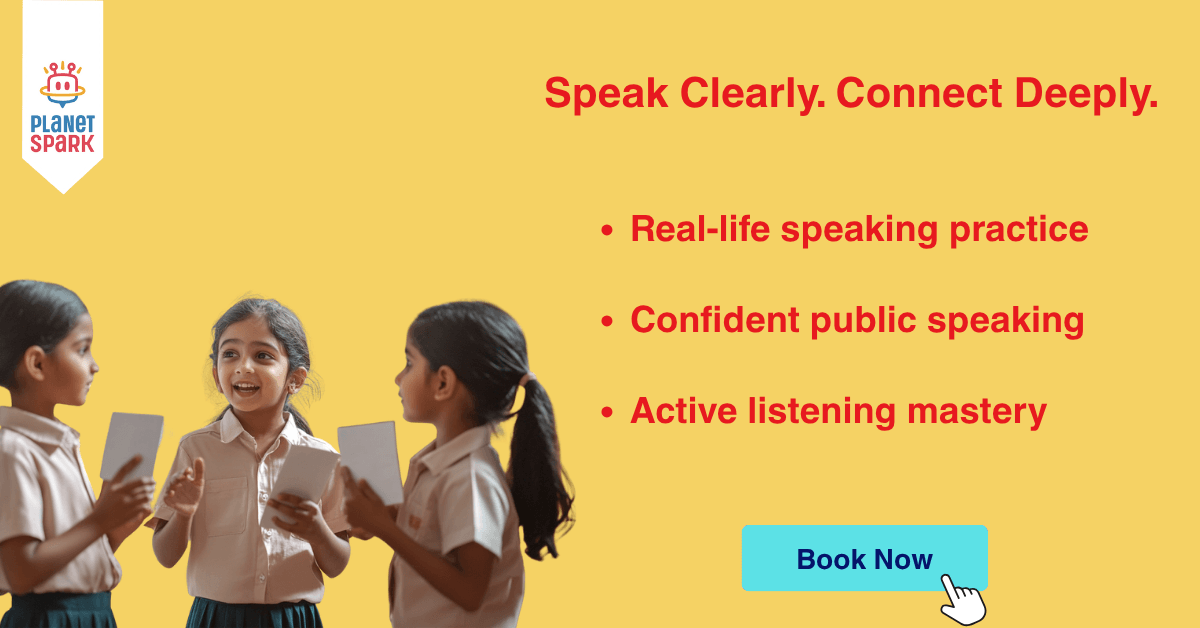How to Improve Conversation Skills: Tips, Books, and Practice

Table of Contents
- What Are Conversation Skills
- Why Are Conversation Skills Important for Kids
- Core Elements of Good Conversation Skills
- Top 7 Elements of Effective Conversations
- Books on Conversation Skills Worth Reading
- How to Improve Conversation Skills
- Common Mistakes in Conversations (and How to Fix Them)
- Role of Communication in Personal Growth
- Mastering Body Language and Nonverbal Cues
- Role-Playing and Practice Sessions
- Etiquette in Digital Conversations
- Creating a Personal Conversation Improvement Plan
- Conversation Skills for Different Age Groups
- Common Challenges in Conversations
- Conversation Skills in the Digital Age
- How PlanetSpark Helps Improve Communication
- Conversation Practice Ideas for Kids and Teens
- Conclusion
- FAQs
In today’s fast-paced and highly digital world, mastering conversation skills can be your greatest superpower. Whether you're networking professionally, making new friends, or trying to leave a lasting impression, the ability to converse naturally and meaningfully can open countless doors. It’s not just about speaking clearly or listening intently- it’s about connecting authentically, responding empathetically, and leaving every interaction better than you found it. Conversations are at the heart of every human interaction. Whether you're catching up with a friend, presenting an idea in a meeting, or making small talk at a social gathering, conversation skills are vital. They influence how we are perceived, how well we connect with others, and how successful we are in our personal and professional lives.
In this blog, we’ll explore why conversation skills matter, how to enhance them, top mistakes to avoid, and recommend some excellent books on conversation skills. If you're wondering how to improve conversation skills or teach your child to become a better communicator, read on.
What Are Conversation Skills
Conversation skills refer to the ability to start, maintain, and end a conversation effectively. They include verbal fluency, listening, body language, empathy, and timing. Good conversationalists know how to engage others, make them feel heard, and leave a positive impression.
Strong conversation skills are essential for:
Building lasting relationships
Excelling in interviews and public speaking
Succeeding in academic and professional settings
Becoming a confident communicator
Why Are Conversation Skills Important for Kids
In an age dominated by digital devices, many children are losing the ability to hold meaningful face-to-face conversations. Teaching conversation skills early helps children:
Express their thoughts clearly
Listen actively to others
Improve vocabulary and language fluency
Build social confidence
From refining your tone to choosing the right words, from practicing open body language to improving cultural awareness, conversation is a dynamic skill that constantly evolves. As you grow, so should your conversational style. Embrace every opportunity—whether a group discussion or a one-on-one coffee chat-as a chance to learn and improve.
Remember, the best conversationalists weren’t born with the gift of gab- they developed it through deliberate practice and self-awareness. PlanetSpark’s communication courses focus on helping kids become confident speakers through structured programs and interactive sessions.
Core Elements of Good Conversation Skills
- Active Listening: Pay attention, nod, maintain eye contact, and avoid interrupting.
- Asking Questions: Show interest by asking open-ended and clarifying questions.
- Body Language: Non-verbal cues like posture, gestures, and facial expressions convey as much as words.
- Empathy: Try to understand the other person’s feelings and perspective.
- Clarity: Speak clearly and use simple language to express your thoughts.
- Turn-Taking: Give others a chance to speak and avoid dominating the conversation.
- Adapting to Context: Tailor your language and tone based on the situation and audience.
Top 7 Elements of Effective Conversations
Clarity: Express your ideas without rambling or ambiguity.
Confidence: Speak with belief in your ideas.
Empathy: Understand and respect other perspectives.
Curiosity: Show genuine interest in others.
Timing: Know when to pause and when to speak.
Humor: Light humor helps break the ice.
Adaptability: Tailor your tone and content based on the audience.
Books on Conversation Skills Worth Reading
If you’re serious about upgrading your communication game, reading the right books can be immensely helpful. Here are some books on conversation skills that offer timeless insights:
"How to Win Friends and Influence People" by Dale Carnegie
A classic book that teaches how to build rapport and win people over with authentic communication."Crucial Conversations" by Patterson, Grenny, McMillan, and Switzler
A must-read for learning how to have meaningful conversations, even under pressure."The Fine Art of Small Talk" by Debra Fine
Perfect for those who struggle with initiating conversations in social or professional settings.“Talk Like TED” by Carmine Gallo
Useful for mastering storytelling and persuasive presentation skills.“Never Split the Difference” by Chris Voss
Written by a former FBI negotiator, this book provides advanced techniques for reading people and negotiating with emotional intelligence.
Reading books on conversation skills is one of the easiest ways to learn from experts and apply tested methods to your daily interactions.

How to Improve Conversation Skills
If you're wondering how to improve conversation skills, the good news is that anyone can get better with consistent effort. Here are some proven strategies:
1. Listen More Than You Speak
The foundation of a good conversation is listening. Don’t just wait for your turn to speak- truly listen to what the other person is saying.
2. Practice Open-Ended Questions
Instead of yes/no questions, ask things like “What was your favorite part of the day?” or “How did that make you feel?” This encourages dialogue.
3. Maintain Eye Contact
It shows that you're paying attention and that you're confident.
4. Watch Your Body Language
Non-verbal cues like nodding, posture, and facial expressions play a huge role in how your message is received.
5. Read and Learn
Read newspapers, novels, or books on conversation skills to expand your vocabulary and understand communication patterns.
6. Join a Communication Course
Enrolling in a program like PlanetSpark’s Communication Skills Training can give you structured learning, expert guidance, and real-time feedback.
Want your child to become a confident speaker?
Enroll in PlanetSpark’s Live Communication Skills Classes and watch them shine!
Book a Free Trial Today!
Common Mistakes in Conversations (and How to Fix Them)
Interrupting frequently – Let the other person finish before responding.
Over-talking – Keep your responses concise and engaging.
Not asking follow-up questions – These show you’re interested and help continue the flow.
Avoiding eye contact – Comes across as nervous or disinterested.
Negative body language – Avoid crossing arms, slouching, or fidgeting.
By recognizing and fixing these habits, you’re already on your way to stronger conversation skills.
Communication is the key to success in every field.
Let your child learn the art of effective speaking with PlanetSpark’s Communication Skills Classes.
Role of Communication in Personal Growth
Strong conversation skills lead to:
Better academic performance
Stronger friendships
Improved confidence in interviews or presentations
The ability to influence and lead
Teaching children how to improve conversation skills helps them grow emotionally and socially. It prepares them for real-world challenges and builds long-term leadership potential.
Gift your child the power of confident communication!
Sign up for PlanetSpark’s Communication and Public Speaking Course.
Mastering Body Language and Nonverbal Cues
Effective conversation skills are not just about what we say- they’re also about how we say it. Nonverbal communication plays a crucial role in how our words are received. A study by Dr. Albert Mehrabian famously suggested that only 7% of a message is conveyed through words, while 38% is tone of voice, and a whopping 55% is body language.
So, how can you apply this in your daily conversations?
Key Body Language Tips:
Maintain eye contact: This signals attentiveness and confidence.
Use open hand gestures: It shows receptiveness and honesty.
Keep your posture relaxed but upright: This shows engagement without intimidation.
Smile naturally: It encourages trust and puts others at ease.
Improving body language helps you align your verbal and nonverbal messages, leading to clearer communication. When both match, you appear more authentic.

Role-Playing and Practice Sessions
If you're wondering how to improve conversation skills, role-playing can be a game-changer. It gives you a safe space to practice difficult conversations- whether it’s giving feedback, answering questions during interviews, or handling disagreements.
Here’s how to get started:
Choose a conversation scenario (e.g., group discussion, customer interaction).
Play both roles to see things from different perspectives.
Record and review your sessions to observe tone, pacing, and clarity.
Ask a peer or mentor to provide feedback.
This practical approach accelerates your conversational growth and builds the confidence to handle diverse interactions.
Etiquette in Digital Conversations
In the digital age, much of our communication has moved to texts, emails, and video calls. But are your conversation skills as strong online as they are in person?
Here are some digital conversation best practices:
Avoid multitasking during video calls- it signals disinterest.
Use full sentences and appropriate grammar in emails and chats.
Be aware of tone- what’s meant as humorous may come across as rude.
Use emojis carefully- they can add warmth, but can also be misunderstood.
Being a strong communicator today means adapting your tone and approach for each platform, be it WhatsApp, Zoom, or Slack.
Creating a Personal Conversation Improvement Plan
Improving conversation skills is a journey. Here’s a sample weekly plan you can customize:
Week 1: Observe and Analyze
Watch 2 TED Talks and focus on the speaker's delivery.
Read one chapter from any of the books on conversation skills.
Reflect daily on one interaction- what went well? What didn’t?
Week 2: Practice and Implement
Join a discussion group or online forum.
Apply mirroring techniques in conversations.
Practice storytelling- share one personal story daily.
Week 3: Get Feedback
Ask a mentor or teacher to evaluate your communication.
Record yourself during a simulated conversation.
Compare your delivery from Week 1 to Week 3.
By building this habit loop- observe, practice, review- you’ll gain clarity on how to improve conversation skills effectively.
Conversation Skills for Different Age Groups
Kids and Teens
For children, developing conversation skills early helps with school performance, friendships, and emotional development. Use storytelling, group activities, and role play to build these skills.
Adults
Adults benefit from refining their conversation techniques for networking, interviews, and managing relationships. Workshops and books can be useful here.
Professionals
In the workplace, clear communication ensures collaboration, leadership, and productivity. Tailor your style to suit colleagues, clients, or superiors.
Common Challenges in Conversations
- Fear of Judgment: Many people fear being judged or misunderstood. Practice can reduce this fear.
- Lack of Confidence: This often stems from past negative experiences. Build confidence gradually.
- Interruptions or Distractions: Learn to manage and minimize them with body language and attention control.
- Dominating the Conversation: Balance speaking with listening.
Conversation Skills in the Digital Age
Texting, emails, and video calls are now standard forms of communication. Here’s how to ensure your conversation skills remain sharp across platforms:
- Use clear, concise language.
- Avoid slang in professional emails.
- Maintain eye contact during video calls.
- Practice tone and empathy in written communication.
How PlanetSpark Helps Improve Communication
PlanetSpark offers interactive classes that enhance speaking and communication skills for kids and young adults. Features include:
- Personalized feedback from expert mentors
- Interactive storytelling, debates, and group discussions
- Confidence tracking and improvement charts
- Exposure to real-world conversation scenarios
Conversation Practice Ideas for Kids and Teens
Role-playing games: Practice situations like ordering at a restaurant or interviewing.
Conversation jars: Use prompts like “What makes you happy?” to spark dialogue.
Group discussions: Encourage daily discussions about a book, topic, or movie.
Mirror talk: Let them rehearse in front of a mirror to build facial expressiveness and clarity.
Ready to take your communication journey to the next level?
Join PlanetSpark’s Communication Skills Program and discover how to speak with clarity, charm, and confidence. From guided conversations to instant feedback, our live classes are designed to make you a master of meaningful interactions!
Let your voice make an impact- because every great conversation starts with the courage to speak.
Conclusion
Conversation skills are more than just the ability to talk- they reflect confidence, empathy, and clarity. Whether you're a student, professional, or parent, investing in this skill is invaluable. Now that you know how to improve conversation skills, the next step is to put theory into action. Read, practice, and join structured programs.
Start early, stay consistent, and you’ll become a confident communicator capable of leading meaningful conversations across any context.
FAQs
1. What are the most important conversation skills to have?
Active listening, asking questions, maintaining eye contact, and being clear and concise are among the most important conversation skills.
2. How to improve conversation skills in children?
Encourage daily discussions, limit screen time, use role-plays, and enroll them in communication programs like PlanetSpark for structured development.
3. Are there any good books on conversation skills for beginners?
Yes! Start with “How to Win Friends and Influence People” or “The Fine Art of Small Talk.” These are excellent books on conversation skills for all ages.
4. How can shy individuals build better conversation skills?
Practice in low-pressure environments, join group speaking classes, and gradually move to larger audiences. PlanetSpark offers confidence-building modules for shy students.
5. Why are conversation skills essential for students?
Students with good conversation skills perform better in class discussions, interviews, presentations, and even in social settings, setting the foundation for future success.
Personalized Communication Report
Record a video to get a AI generated personalized communication report for your child

Hi There, want to try these
tips for your child with
LIVE with our expert coach?
Let's check your child's
English fluency
